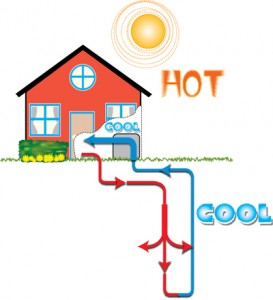SEER and EER: Ground Source Heat Pumps are different
 Last month we wrote about SEER ratings on HVAC equipment. There is some HVAC equipment that does not measure efficiency seasonally. You may remember that the “S” in SEER stands for Seasonal.
Last month we wrote about SEER ratings on HVAC equipment. There is some HVAC equipment that does not measure efficiency seasonally. You may remember that the “S” in SEER stands for Seasonal.
Ground Source Heat Pumps or Geothermal Heat Pump measure their efficiency simply as EER or Energy Efficiency Ration and an additional item called COP or Coefficient of Performance.
These two items are described below:
- Energy Efficiency Ratio (EER) – a measure of efficiency in the cooling mode that represents the ration of total cooling capacity to electrical input.
- Coefficient of Performance (COP) – a measure of efficiency in the heating mode that represents the ratio of total heating capacity to electrical energy input.
As with any heat pump, geothermal and water-source heat pumps are able to heat, cool, and, if so equipped, supply the house with hot water. Some models of geothermal systems are available with two-speed compressors and variable speed fans for additional comfort and increased energy savings. Relative to air-source heat pumps, they are quieter, last longer, need little maintenance, and do not depend on the temperature of the outside air.
Even though the installation price of a geothermal system can be several times that of an air-source system of the same heating and cooling capacity, the additional costs are returned to you in energy savings in 5-10 years. System life is estimated at 25 years for the inside components and 50+ years for the ground loop. There are approximately 50,000 geothermal heat pumps installed in the United States each year.
According to the Environmental Protection Agency, geothermal ground source heat pump systems are one of the most energy-efficient, environmentally clean, and cost-effective space conditioning systems available. About 70 percent of the energy used by a geothermal heat pump system comes in the form of renewable energy from the ground. High-efficiency geothermal systems are on average 48 percent more efficient than gas furnaces, 75 percent more efficient than oil furnaces, and 43 percent more efficient when in cooling mode.
Since a geothermal heat pump system burns no fossil fuel on-site to produce heat, it generates far fewer greenhouse gas emissions than a conventional furnace, and completely eliminates a potential source of poisonous carbon monoxide within the home or building. Even factoring in its share of the emissions from the power plant that produces the electricity to operate a geothermal heat pump system, total emissions are far lower than for conventional systems.
- Posted by
 Mike
Mike - Posted in Building Science, HVAC
 Sep, 01, 2012
Sep, 01, 2012 Comments Off on SEER and EER: Ground Source Heat Pumps are different
Comments Off on SEER and EER: Ground Source Heat Pumps are different

 call us at 770-859-9100
call us at 770-859-9100
